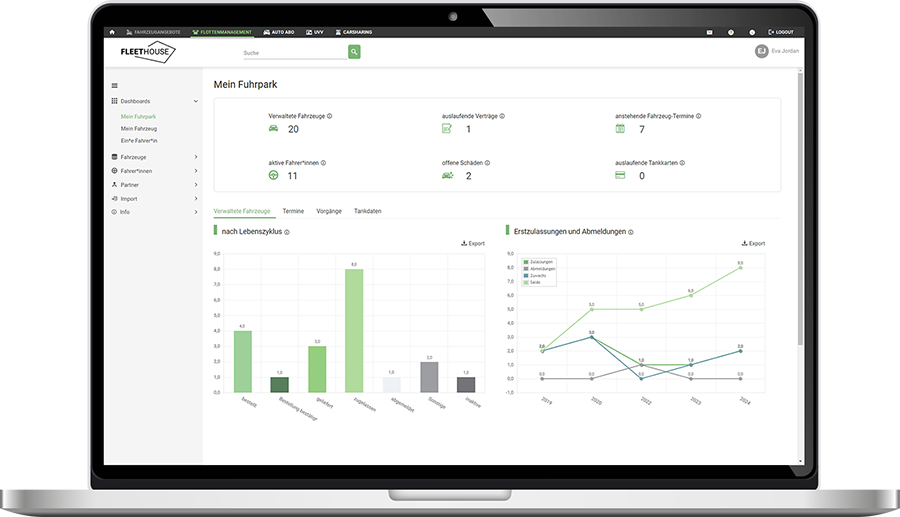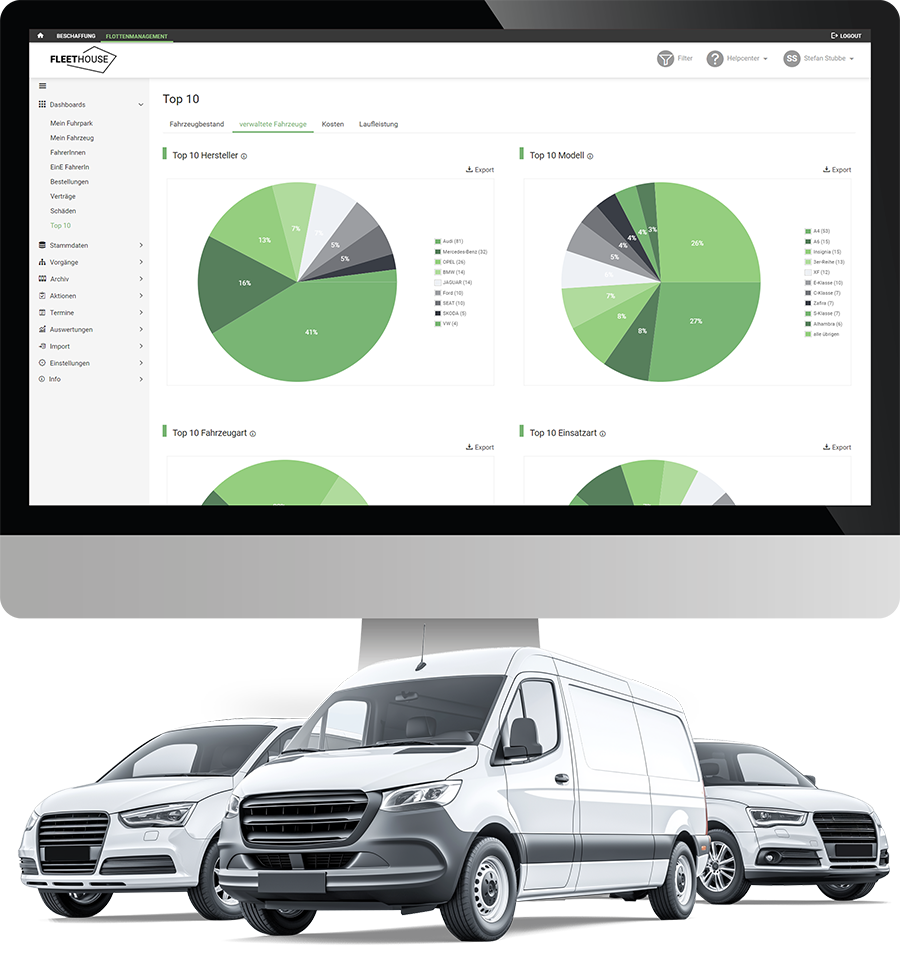If you manage a fleet of vehicles, then you certainly know the challenges of managing and organizing them. According to a Dataforce 2024 study, nine out of ten fleet management tasks have become more complex in recent years. Yet efficient fleet management can make a big difference to your company’s productivity and profitability. While Excel is a widely used tool for data collection and analysis, fleet managers quickly reach its limits. In this article, we explain how digital fleet management works without Excel and how software can also make your day-to-day work easier.
Contents
The disadvantages of fleet management with Excel
Excel is a spreadsheet software from Microsoft that is mostly used to record, process and analyze data and information. It is a versatile software that is used in almost all companies for a variety of tasks, including managing databases, creating charts and templates and performing a wide range of calculations.
Although the tool is a very practical and versatile tool in everyday office life, Excel quickly reaches its limits in fleet management. Here are some of the disadvantages of Excel that need to be considered when managing vehicles in a fleet:
- Lack of automation: Excel is a manual tool. This means that you have to enter all data and key figures manually and constantly update them yourself. As a result, there is a risk of errors and data loss, which can lead to inefficient and inaccurate results. As a result, manual data entry is also very time-consuming and resource-intensive.
- Difficulties with data evaluation: Although fleet management with Excel offers various functions for analyzing data, it is still difficult to process complex data volumes and create meaningful reports.
- Lack of integration: Excel is not able to interact seamlessly with other systems and exchange information. This means that it is difficult to bring together data from different sources in order to collect and process it clearly in one place.
- Difficulties with scaling: As your fleet grows, so does the amount of data. The task of correctly managing and organizing all this fleet management data and information in Excel can quickly become overwhelming for fleet managers.
- Low flexibility: An Excel template is not as flexible as specialized fleet management software. If you want to create user-defined reports and analyses or require additional modules for vehicle management or controlling, Excel quickly reaches its limits.
- Security risks: Excel templates are susceptible to data loss and hacking attacks, which can put your data and information at risk. If you store sensitive data such as personal identification numbers (PINs) or credit card information in Excel templates, you are particularly vulnerable to cyber attacks. And how easy it is to click on the wrong attachment in an e-mail.
- Lack of documentation: Unlike standard software, Excel solutions usually have no documentation. If the “author” then leaves the company, problems can quickly arise with complex solutions, as it is not clear at first glance which formulas and markers have been used or whether there are links between different tables.

Do you want to give Excel the boot?
Register with Fleethouse and manage your company vehicles completely digitally.
What fleet software does: definition and functions
Fleet software is specially developed software for the administration and organization of vehicles in companies. It offers a wide range of functions for managing vehicles and controlling costs. In addition, a digital solution enables the management of insurance, maintenance, repairs and legal obligations. For example, software solutions can support fleet managers with important tasks such as claims management or cost control in the fleet. Additional modules such as electronic driver’s license control or corporate car sharing for the management of pool vehicles can comprehensively supplement fleet management.
The features of fleet software can vary depending on the provider, but in general they offer a variety of tools to improve efficiency, cost savings and the overall performance and functionality of your fleet. These include:
- Organized dashboards for an overview of important key figures in real time
- Convenient recording of all driver data in one central location
- Automatic reminders of important dates and deadlines, such as repairs, HU or AU
- Monitoring of odometer readings
- Administration of insurance policies, vehicle documents, contracts and logbooks
- Reporting and analysis of data and processes in the fleet
- Practical administration of official processes
In our free guide, we give you tips on how a software solution can make your day-to-day fleet work easier: Getting started with digital fleet management

The advantages of fleet software for fleet management
According to the“Fleet Manager Insights – 2022 Germany“, only nine percent of fleet managers surveyed consider digitalization in their area to be very high. Yet digitalization with the help of a fleet software provider can offer many advantages. In contrast to fleet management with Excel, fleet software can greatly simplify day-to-day office work. It relieves fleet managers enormously, minimizes administrative work and simplifies communication with employees. The plus points include:
- Automation of time-consuming routine tasks: Fleet software automates many manual processes such as recording driver and vehicle data or updating odometer readings. This saves fleet managers valuable time, which they can use for other tasks in their day-to-day business.
- Reduce costs: With software, you can keep an eye on fleet costs, quickly identify cost outliers and manage fleet processes accordingly.
- Meet appointments and deadlines: A digital solution automatically reminds you of upcoming and overdue deadlines so that important deadlines can be met.
- Integration with other systems: Fleet software can be seamlessly combined with other systems such as GPS tracking software and telematics systems. This ensures efficient data integration and processing.
- Improved efficiency: Fleet software enables efficient planning of routes and journeys, which can lead to better use of resources, a reduction in vehicle idle times and unnecessary costs.
- Higher data quality: fleet software enables accurate data collection and processing, which leads to higher data quality. This data can then be used to make well-founded business decisions for the vehicle fleet.
- Simple data evaluation: fleet software offers an intuitive user interface and enables simple data evaluation. After all, this makes monitoring, controlling and fleet management much easier.
- Easy extensions: Additional modules can be added to fleet management software as required. For example, for corporate car sharing, owner liability or car subscriptions.

Digital fleet management
With Fleethouse, you can test digital fleet management free of charge, as you can use all the software functions for 30 days without obligation.
Our conclusion for digital fleet management vs. Excel
Even if fleet management with Excel appears to be a cost-effective option at first glance, the tool’s functions are still not sufficient for efficient vehicle organization. In addition to being error-prone and time-consuming, data maintenance for fleet management in Excel is also exposed to a security risk. Fleet management software, on the other hand, relieves those responsible in day-to-day business and minimizes the effort involved in fleet management.
FAQ - Fleet management without Excel
Instead of using Excel for fleet management, you can switch to digital fleet software. It has all the important functions for managing your vehicles and helps you save time and money.
In any case! Even small fleets can benefit from fleet software like Fleethouse. The various modules offer enough flexibility to meet your needs, even for small fleets with fewer vehicles.
No. If you already use Excel for fleet management, you can simply import the data into the software using the Fleethouse templates. This makes it easy to switch over.
Arrange an online consultation appointment
Arrange your personal consultation appointment now. You can easily select a suitable appointment using our booking tool.

Anne Fuchs

Ciara Lazeta
Briefly summarized
Excel is a spreadsheet software that is used, for example, to manage databases, create diagrams and perform calculations.
Fleet software is specially developed software for the comprehensive management and organization of vehicles. This allows processes to be automated and costs and time to be saved.
Unfortunately, fleet management with Excel has many disadvantages such as a lack of automation, difficult data evaluation, lack of integration, low flexibility and security risks. Fleet management software is a good alternative.
Further Fleet Knowledge
If you liked this article and would like to know more about this topic, we recommend these articles.
More articles on the topic of fleet management Excel vs. software
Basic areas of fleet management
Cost Drivers in the Vehicle Fleet: How you can Reduce your Costs
Digital fleet management: Why even small fleets should digitize their fleets
Measures for sustainable fleet management
Duties in the Fleet: UVV Instruction for Drivers
Fleet outsourcing: pros and cons






